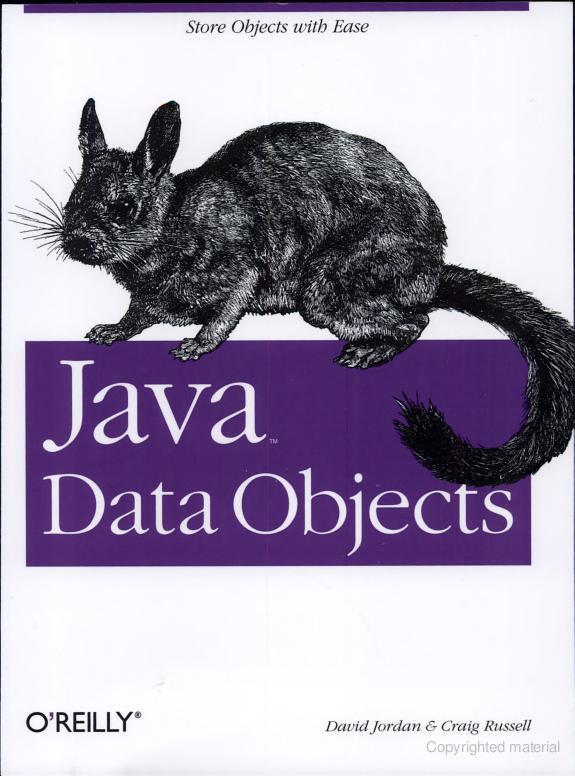
Java Data Objects PDF
Preview Java Data Objects
Java Data Objects revolutionizes the way Java developers interact with databases and other datastores. JDO allows you to store and retrieve objects in a way that's natural to Java programmers. Instead of working with JDBC or EJB's container-managed persistence, you work directly with your Java objects. You don't have to copy data to and from database tables or issue SELECTs to perform queries: your JDO implementation takes care of persistence behind-the-scenes, and you make queries based on the fields of your Java objects, using normal Java syntax.
The result is software that is truly object-oriented: not code that is partially object-oriented, with a large database-shaped lump on the back end. JDO lets you save plain, ordinary Java objects, and does not force you to use different data models and types for dealing with storage. As a result, your code becomes easier to maintain, easier to re-use, and easier to test. And you're not tied to a specific database vendor: your JDO code is entirely database-independent. You don't even need to know whether the datastore is a relational database, an object database, or just a set of files.
This book, written by the JDO Specification Lead and one of the key contributors to the JDO Specification, is the definitive work on the JDO API. It gives you a thorough introduction to JDO, starting with a simple application that demonstrates many of JDO's capabilities. It shows you how to make classes persistent, how JDO maps persistent classes to the database, how to configure JDO at runtime, how to perform transactions, and how to make queries. More advanced chapters cover optional features such as nontransactional access and optimistic transactions. The book concludes by discussing the use of JDO in web applications and J2EE environments.
Whether you only want to read up on an interesting new technology, or are seriously considering an alternative to JDBC or EJB CMP, you'll find that this book is essential. It provides by far the most authoritative and complete coverage available.
About the AuthorDavid Jordan founded Object Identity, Inc. in 2001 to provide JDO consulting services. He became interested in the integration of object type systems and databases while earning his M.S. in Computer Science in the early 1980s. At Bell Labs in 1985, he initiated the development of the first C++ object database. He has developed a variety of applications using C++ object models on top of network, relational, and object database systems. Bell Labs appointed him a Distinguished Member of Technical Staff in 1990 for his contributions in object and database technologies. The Object Data Management Group (ODMG) asked him to serve as their C++ editor in 1993. He served in that role until 2000 and was appointed their Java editor in 1998. He coedited four books published by the ODMG. David served as a C++ Report columnist describing the ODMG standard from 1994 to 1996, at which point he stopped to write his first book, C++ Object Databases. David started using Java in late 1995. Upon his selection as ODMG's Java editor, he became a columnist for Java Report, initially covering ODMG and then JDO. David was part of the small group that initiated JSR-12, and he became one of the initial members of the JDO expert group. The JDO specification has a special acknowledgment of David's contributions to the JDO standard. When the JDOcentral.com community web site was formed, David was selected to serve as its moderator. David can be reached at [email protected]
Craig Russell studied applied mathematics at Harvard University (B.A. '70 - '71) and acquired practical experience working as a technician repairing mainframes with the computing power of a 1997 model laptop. His early experiences in distributed computing included building applications with CICS and DL/I and designing heterogeneous network server implementations for file, print, and communications sharing among personal computers. Craig later dealt with issues of persistent object interoperability among Smalltalk, C++, and Java and integrating object and relational databases using X/OPEN XA protocols and commercial transaction processing systems. Craig served as the Java Chair of the Object Data Management Group and played a key role in the development of the ODMG 3.0 Java binding. For the next standard for database access from Java, the ODMG decided to support the Java Community Process as the delivery vehicle. With support from all major relational database and middleware vendors, Java Specification Request 12, Java Data Objects, was proposed in May 1999 and released in April 2002. Concurrent with the development of the JDO standard, Craig's primary responsibility was to lead the implementation of the object-relational database engine for several Sun products, including Java Blend and Forte for Java Transparent Persistence. Craig currently is the architect for the Container Managed Persistence implementation of Sun ONE Application Server, where he deals with the reality of implementing the high-performance, specification-compliant version of the object-relational database component of the J2EE application server.
